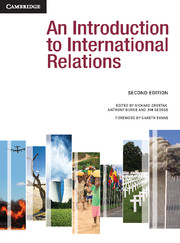Book contents
Preface and acknowledgements
Summary
Preface and acknowledgements
This textbook is designed specifically for students studying Introduction to International Relations courses. The success of the first edition, followed by encouraging reviews and conversations with overseas colleagues, led us to prepare a second edition aimed specifically at an international audience. The text has been enlarged and substantially revised with this in mind, and includes new authors from the US and Europe. Where the first edition of this book drew largely upon scholars teaching and researching in Australia, or Australian scholars overseas, for this edition a broad range of new contributors has written on topics previously covered and on new topics, while previous contributors have made updates and revisions to all the remaining chapters. Much of the material excised from the first edition is now available on the new companion website – an important supplement to this book’s second edition.
Like any good textbook, this one aims to introduce students to the study of International Relations (IR) by laying out its chief theories, main actors and institutions, and leading issues, in a manner that both excites interest and lucidly explains topics for students with no previous background in IR. Carving up the topics of a complex, dynamic, growing discipline like IR is no easy task. Decisions must inevitably be made about which topics to include, and which to exclude. Topics chosen no doubt reflect but one particular perspective of the discipline’s present make-up, one account of what is important for students to learn, and what is not. Since there is no single correct way to present the material to undergraduate students, there is always a degree of arbitrariness involved in topic selection; and we do not pretend otherwise. However, we believe that the structure adopted here, developed over years of teaching undergraduate Introduction to IR courses in Australia and the UK, offers one useful way into the wide range of fascinating topics that fall under the heading International Relations.
- Type
- Chapter
- Information
- An Introduction to International Relations , pp. xxix - xxxiiPublisher: Cambridge University PressPrint publication year: 2011



